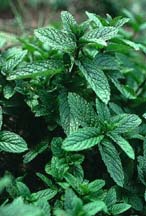 An international group of researchers report that peppermint oil is “more effective than placebo in the treatment of irritable bowel syndrome (IBS).”
An international group of researchers report that peppermint oil is “more effective than placebo in the treatment of irritable bowel syndrome (IBS).”
It compared favorably to fiber and antispasmodic drugs too.
First, the details.
- All studies included adults randomly assigned to take peppermint oil, fiber, or an antispasmodic vs. placebo or no treatment.
- Minimum study duration was 1 week.
- Studies had to report global assessment of cure or improvement in symptoms, or cure of or improvement in abdominal pain, after treatment.
- Data were pooled for the meta-analysis.
And, the results.
Peppermint oil
- Compared to placebo in 4 studies of 392 patients.
- 26% of patients treated with peppermint oil had persistent symptoms vs. 65% with placebo.
- 2.5 patients must be treated with peppermint oil to prevent persistent symptoms in 1 patient.
- 5 side effects were reported with peppermint oil vs. none with placebo.
Fiber (bran, ispaghula husk [psyllium], “concentrated” fiber of an unspecified type)
- Compared to placebo or no treatment in 12 studies of 591 patients.
- 52% of patients taking fiber had persistent or unimproved symptoms after treatment vs. 57% with placebo or a low fiber diet.
- Overall, 11 patients must be treated to prevent persistent symptoms in 1 patient.
- 6 patients must be treated with ispaghula to prevent persistent symptoms in 1 patient.
- 3 patients taking fiber reported side effects vs. 2 with placebo.
Antispasmodics
- Compared to placebo in 22 studies of 1778 patients.
- 39% of patients taking antispasmodics had persistent symptoms after treatment vs. 56% with placebo.
- Overall, 5 patients would have to be treated with an antispasmodic to prevent 1 patient from having symptoms.
- Otilonium, 3 to 4.5 patients treated to prevent persistent symptoms in 1 patient.
- Cimetropium and pinaverium, 3 patients treated to prevent persistent symptoms in 1 patient.
- Hyoscine 3.5 patients treated to prevent persistent symptoms in 1 patient.
- Trimebutine was no different than placebo.
- Others evaluated in a single study that showed fewer than 2 patients must be treated to prevent symptoms in 1 patient included mebeverine, alverine, dicycloverine, pirenzipine, prifinium, propinox, and rociverine.
- Side effects were reported in 14% of patients taking antispasmodics vs. 9% taking placebo.
The bottom line?
The authors concluded, “Fiber, antispasmodics, and peppermint oil are all more effective than placebo in the treatment of irritable bowel syndrome.” However, “adverse events were significantly more frequent in those receiving antispasmodics than in those receiving placebo, but none of these was serious.”
OK. But I’d go a step further. In practice, there’s no substitute for prescribing effective treatment. Patients should be placed on the most effective and best tolerated treatment(s) first. Anything less leads to patient frustration, poor compliance in taking their medicine, and a lack of confidence in future recommendations by the doctor.
Based on what we know about its effectiveness and safety, it’s pretty clear that peppermint oil should be included in any treatment designed to control symptoms of IBS.
11/15/08 10:46 JR